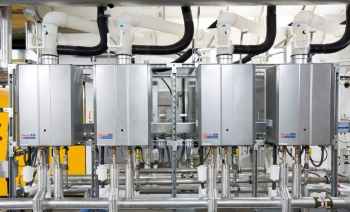A missed opportunity?

Chris Goggin of Rinnai expresses his disappointment that Building Regulations will not require retrofit water heating in existing buildings to be as efficient as in new build.
There is widespread acceptance of the pressing need to conserve energy on all sites — both residential and commercial. But the Government looks set to miss a golden opportunity to alleviate the strain on our over-stretched energy network and counteract poor enforcement. Part L of the Building Regulations, due for implementation in October this year, looks as though it could miss a golden chance to make real cuts. And the barrier to progress appears to the preservation of old, outdated and outmoded technologies.
The UK is facing an energy shortfall. Demand is fast outstripping supply to the point where there are dire warnings of power cuts. We have a combination of slow adoption of renewable power generation and a stagnating and somewhat confused programme to build new nuclear power plants. We all need to be smarter in our energy consumption. And legislation has been a major tool in forcing the market to adopt new products and practices.
In addition, the UK has legally binding commitments to reduce greenhouse-gas emissions to achieve the much-vaunted 34% reduction by 2020. We also face the growing need to reduce energy-related costs and the long-term security of energy supplies.
Add in the unambiguous warning by industry experts that the Government had ‘significantly underestimated the scale of the capacity crunch facing the UK’ then the fear and the reality of energy blackouts in the short term is a very real risk.
So, logically, we need to act now to safeguard and preserve energy resources.
A recent report from the Building Research Establishment stated that we need to target the existing building stock if we are to have a positive and dynamic impact in reducing CO2 emissions. Some sources suggest that as much as 40% of all emissions come from existing building stock.
But despite this the legislators are proposing the implementation of much higher product efficiencies for direct-fired water heating should apply solely to new build within their proposed changes to Building Regulations, Section 2 – Part L (Conservation of fuel and power).
Only last year Ken Bromley of the Department for Communities & Local Government (DCLG) confirmed that all direct-fired water heaters would have to achieve minimum gross efficiencies of 90% for natural gas and 92% for LPG for new and existing buildings.
This was later retracted after ‘discussions’ with some of the industry. It was concluded that this wasn’t the best way forward and splitting new from existing buildings was agreed by some, but not all.
Enforcing the use of high-efficiency technologies for water heating wholesale would have effectively promoted energy-saving changes across the complete built environment. It could have a profound impact on carbon emissions and reducing the burden on the faltering energy network.

Instead, when replacing systems in existing building stock, the figures for minimum efficiencies have remained at near the levels of the 2010 Building Regulations (73% for Natural Gas and 74% for LPG appliances). This is a missed opportunity by Government, as it would have also provided the ideal platform to counteract one of the key weaknesses of Part L — reducing the anomaly of installers opting for the ‘cheapest first option or retrofit’. This is a retrograde move when high-efficiency condensing appliances are already on the market with up to 107% efficiency. It is puzzling too, especially in the face of all domestic heating boilers being, by law, of high-efficiency type for almost a decade
The new proposals surfaced at the same time as it was reported daily CO2 readings at a US government agency lab on Hawaii have topped 400 parts per million for the first time. According to a BBC News report, Sir Brian Hoskins, the head of climate change at the UK-based Royal Society, said the figure should ‘jolt governments into action’. However, BBC environment analyst Roger Harrabin commented that the EU was backing off the issue, and cheap fossil fuels looked attractive to industries.
The new proposals do recommend extra efficiency credits in an existing building environment by proposing effective heat generator seasonal efficiency which, in essence, is the thermal efficiency of the appliance with added credits for decentralisation and additional controls.
In other words the old energy-inefficient ways can stay.
The importance of controls to improve energy usage for smarter grids is also mentioned in the proposed amendments to the Building Regulations. Better and improved controls yielding energy savings is a road that reputable and technologically advanced and committed manufacturers are already following. Controls will be immensely important as we move to smarter grids in the future.
End users and the environment need those water-heating products which deliver cost savings on installation — coupled with low running costs, ease of maintenance, lower life-cycle costs, and the highest possible energy efficiencies.
Part L needs to be anti-Luddite, not a Luddite Charter.
Chris Goggin is operations manager with Rinnai.







